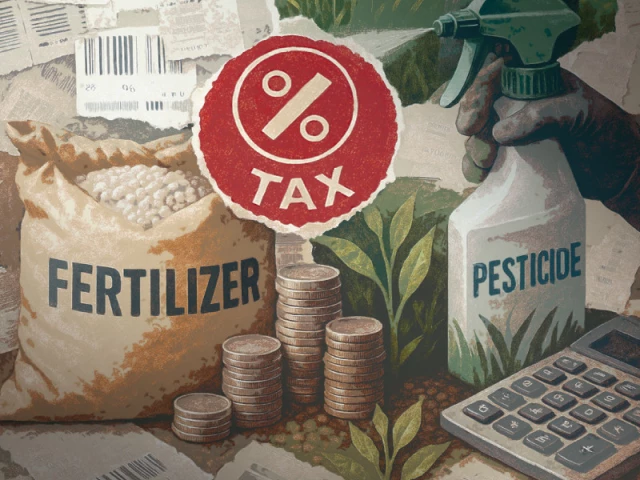Islamabad:
The International Monetary Fund (IMF) has once again raised the question of introducing additional taxes on fertilizers and introducing a excise tax on the use of pesticides to partly offset a loss in the annual tax target requested to postpone until next year.
The global lender has asked the government to trigger the contingency measure by doubling the federal excise rate on fertilizer to 10% and introducing a 5% federal excise tax on pesticides, according to government sources involved in the negotiations with the IMF. Sources said the IMF team during ongoing discussions noted that the Federal Board of Revenue (FBR) could fall below its target with at least RS400 billion to RS500 billion, depending on several factors.
However, the IMF may not immediately cut the target or press to cover the entire expected deficiency through further measures. With only two days back in the end of the negotiations, there is a possibility that the IMF can agree to reduce the target in the range RS167 billion to RS240 billion, the sources added. The development comes at a time when at least 3.3 million hectares of land are underwater in Punjab, and 27 districts, mostly rich in cash crops, have suffered medium to high losses. The provincial government ends a help pack.
Officials said the IMF was not pressing hard after the government assured it that it would take these measures during the next review if the FBR’s tax collection remains lower than the revised estimates.
The question remains open for discussion and the final position will be known when the last draft of the Memorandum of Economic and Economic Policy (MEFP) – the set conditions that Pakistan will follow for the next review – shared.
The government had set an RS14.13 trillion tax target for FBR, but during the first quarter the collection came card with RS198 billion.
The new FBR target could be between RS13,963 trillion and RS13.89 trillion, according to FBR officials. They said the audit may involve reducing the VAT tax target by RS240 billion to slightly below RS7 trillion for the current financial year.
The agricultural sector is already struggling after the government suddenly withdrew the agricultural support prize mechanism without timely notice to the farmers, Syed Naveed Qamar, former finance minister under Pakistan Peoples Party (PPP) said. Qamar said his party would oppose any step that increases the cost of agricultural entrances, especially at a time when flooding and the withdrawal of the wheat support price has negatively affected the income of the farmer. The sector has struggled with climate change and limited water availability, he added.
Meanwhile, the Sindh government extended the Monday’s deadline for filing SINDH Agricultural income returns by one month to 30 October, according to a review from Sindh Revenue Board. This will be the first tax return that the agricultural community will submit in accordance with new provincial income tax laws enforced as part of the IMF Bailout package of $ 7 billion.
The question of increasing the tax on fertilizers and pesticides also appeared in June this year. However, after opposition from PPP, Prime Minister Shehbaz Sharif asked the IMF to postpone the case. If the government’s latest postponement request is accepted, this will be the second time in three months that the IMF has changed its attitude towards the issue.
However, the IMF’s renewed focus on the case is raising issues of timing, given the serious burden that the agricultural sector is already facing. The sector has suffered losses and as a result, overall economic growth is likely to remain below target.
Against the government’s target of 4.2%, sources said the IMF has expected economic growth to vary between 3% and less than 3.5% for the current financial year.
The IMF noted that the recent floods have weighed the prospects, especially for the agricultural sector, considering the damage to Major Kharif crops. The lender continues to project relatively lower economic growth in the medium term.
Sources said the IMF believes that effective implementation of economic policies can help the economy to anchor macroeconomic stability, increase external competitiveness and improve the business environment of the private sector and support a gradual growth collection to 4.5%.
At the time of negotiations for the $ 7 billion Bailout package, the federal government had committed to end preference treatments to reduce distortions. It explicitly told the IMF that “its large interventions in markets for agricultural products, including fertilizers, are no longer suitable for purposes” to ensure food security.
The low or no federal excise duty (bold) rate of fertilizer and pesticides has been described “distortions that suffocate activity and innovation in the private sector, worsened award volatility and hamstring and placed fiscal sustainability in danger”.
Both the IMF and the federal government believe that farmers’ excessive use of fertilizer contributes to environmental pollution.
Meanwhile, Planning Minister Ahsan Iqbal was Monday with chairman of the first meeting of the Cabinet Committee for Agriculture, Climate and Flood Situals, composed by the Prime Minister.
The Minister emphasized the urgent nature of providing rapeseed to farmers within 15 days to take advantage of soil moisture left behind by the floods. “I have arranged a 5,000-hectare rapeseed pilot project in Narowal through corporate sponsorship because we can’t afford to lose time. This is a moment for urgent action-we must not waste it,” he said. IQBAL also established three tasksfores, which will prepare detailed reports of immediate agricultural relief and seed supply, climate change effect and resilience strategies.



